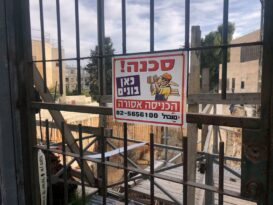The outbreak of the Swords of Iron War, two months ago, shook millions of Israelis and Jews around the world, many of whom were also affected as anti-Semitic and anti-Israeli protests intensified. As previously reported on Buyitinisrael, these developments have led to an increased interest in Israel’s housing market and the purchasing of a home by foreign Jews, whether as part of their Aliyah process, as a preliminary step, as an “insurance policy” in case things deteriorate in their country of residence, or as a way to help and support the Israeli economy in its difficult hour.
Not only were Israelis and Jews in the Diaspora shocked by the developments, but even the Israeli housing market has not remained indifferent. Over the past two months, there have been significant changes on the “homefront” that anyone interested in buying a home in Israel should be familiar with. In time for Chanukah, which starts on Thursday evening this week, we are highlighting eight important shifts that the Israeli housing market has seen as a result of the war.
1. Home purchase transactions
Even before the Swords of Iron War began, there was a sharp drop from the end of 2022 in the number of home purchase transactions, in some cases by 30%-40% compared to the corresponding periods in the previous year. The reasons for this are the increase in interest rates that made mortgages more expensive, and the judicial reform crisis that tore the country apart and halted investments in Israel, affecting mainly the high-tech industry.
Then, after the October 7 massacre, the war broke out and transactions came close to a standstill. Preliminary data on the volume of sales in October, published by the Ministry of Finance, found that “the level of transactions in October was even lower than that recorded in April 2020, during the first lockdown with the outbreak of the COVID-19 pandemic.”
The low rate of transactions also impacts the number of unsold new homes. Until just before the war, developers were building at a high rate but were not selling. As a result, the number of unsold new homes in the economy was 62,500, the highest supply of unsold homes in Israel’s history.
2. Real estate prices
The decline in demand in Israel’s housing market described in the previous section was reflected in a moderate, albeit prolonged, decline in home prices throughout 2023. The Central Bureau of Statistics Home Price Index demonstrated a decline of 1.8 percent in home prices in the six months between March and September. New home prices declined more significantly, by 3.9 percent within the year. Although these rates are moderate, it is not surprising, since one of the most prominent features of the housing market in Israel, is that it is characterized by periods of moderate declines followed by periods of rapid and sharp price increases. The last period of price increases ended about a year ago.
The outbreak of the war is expected to intensify this trend — however weak the market was beforehand, it has further deteriorated in the two months since October 7. This means that prices, which until now have declined at a moderate pace, will begin to decline at a more accelerated pace. But even so, it is difficult to believe that we will see a significant fall in prices, something that has hardly occurred in the Israeli market, especially in the last few decades.
3. Pace of construction
Since the outbreak of the war, developers have faced a serious problem – their laborers have disappeared. Until 7 October, most of those in “wet” jobs (i.e. plaster, flooring, formwork, and ironwork) were Palestinians, numbering about 100,000 people in total, all of whom have been unable to enter construction sites for two months. In their absence, the industry relies on about 13,000 foreign workers (out of 17,500 who were in Israel before the war) from Moldova, China, and Ukraine, and around ten-thousand Israelis. This is, of course, a severe blow to the industry. Many construction sites are still shut, while others are operating at partial capacity. The government is currently trying to bring in tens of thousands more foreign workers to cover the absence of Palestinians, but this will take months.
From the standpoint of Israel’s housing market, this means that despite the large supply of unsold homes that exists today, when purchasing returns to normal, the supply is likely to rapidly decrease, and the pace of construction of new homes will be slower than previously. Therefore, buyers, who may be the stronger party in the sales process today, should be aware that there is a good chance that within six months or a year from now, the balance of power between them and the sellers will change.
4. Interest rates
Long before the war, and even before the judicial reform crisis and the economic slowdown that came with it, it was interest rates that poured cold water on the level of demand in Israel’s housing market. In ten consecutive interest rate hikes, from April 2022 to May 2023, the Bank of Israel increased the interest rate from 0.1 percent to 4.75 percent, thereby sharply increasing mortgage prices. With that, the required level of income for a household to receive a mortgage from the bank has also increased, meaning there are now fewer households with the purchasing power to buy a home. Also, it should be remembered, that high interest rates dramatically affect developers, who face heavy financing costs and are therefore pressured to sell.
Now, following the outbreak of the war, and the economic blow that landed on the economy as a result, there is an expectation of an imminent interest rate cut by the Bank of Israel, which should help the public consume and spend money, and revive the economy. In a recent analysis conducted by Bank Discount‘s Chief Economist, it was estimated that the interest rate will indeed be reduced by 100 percent in the next 3 months. From a real estate perspective, developers and salespeople hope that just as raising the interest rate was the move that started the slowdown in the field, lowering it will herald the return of buyers to sales offices.
5. Rental prices
Currently, approximately 130,000 people across Israel have been evacuated from their homes. One would assume that such a large amount of the population in need of a temporary housing solution would lead to pressure on the rental market, and hence to an increase in prices, but, surprisingly, the opposite is happening. The latest price index published by the Central Bureau of Statistics showed a reduction of about 0.4 percent in rental prices, after a long period in which rental prices increased rapidly.
The explanation for this phenomenon lies mainly in the slowdown in the economy as a whole, which often harms the younger and economically weaker. With about half of the restaurants and cafes in Tel Aviv yet to reopen since the war began, thousands of waiters, cooks, bartenders, and other related workers have no jobs, and the same is true of store salesmen, etc.
This means that today you can find more affordable rentals where rental prices were previously considered outrageously expensive – Tel Aviv and Jerusalem. Just as in the purchasing market, the power today, in the rental market, is with the consumer.
6. Safe rooms and protection
The thousands of rockets fired at Israel since the outbreak of the war on October 7 have underscored the importance of the element of protection in homes. Since the 1990s, every new apartment built in Israel must include a “protected apartment space” (mamad) – a room whose walls are built of reinforced concrete, and whose windows are made of steel, for protection in the event of a missile attack.
In the decades since the regulation requiring their construction went into effect, mamad rooms have not received much attention. However, in the past two months since the outbreak of the operation, they have become an obligatory feature in every apartment, so much so that those who live in an apartment without a safe room have moved in with family or friends until the situation stabilizes. And it’s not just a safety element — shared shelters in buildings may provide the same level of protection, however, a safe room inside the home makes it possible to put small children to sleep without the need to wake them up if the attack occurs during the nighttime hours.
Alongside the surge in demand for apartments with a mamad, there has also been a drop in demand for apartments without a safe room. Recently, the Real Estate Appraiser’s Office estimated the decline in the value of apartments without a safe room by about 10%, as a result of the war.
7. The new demand map
Until now, the main areas of demand in Israel’s housing market have been determined by one prominent center of gravity – the city of Tel Aviv. Proximity to Tel Aviv determines the level of demand when the metropolitan boundaries extend from Haifa in the north to Ashkelon in the south. Another smaller focal point is Jerusalem and its environs.
However, the war has created a new divide, with areas that have experienced multiple missile warnings becoming less popular, while areas that have not had a single warning, until now, are gaining increasing popularity.
The boundaries of the new demand zones are Raanana in the south and Haifa in the north. In the center is Netanya – a desirable coastal city even in normal times, whose location about 40 kilometers north of Tel Aviv, out of range of Hamas rockets, has made it a popular destination for Israelis seeking tranquility. Other cities where there have been no sirens so far are Hadera, Pardes Hanna-Karkur, and Harish. These are all cities located north enough to stay out of range of Hamas rocket fire, but also south enough not to feel the unrest on the northern border.
On the other side of the block are Ashkelon and Ashdod, cities that were considered relatively desirable until the start of the war, and now no one talks about them in real estate contexts. Rishon LeZion and Holon, two of the country’s most central and sought-after cities, are also currently suffering from a large number of sirens.
The main impact now is mainly on rental prices. Cities such as Netanya and Pardes Hanna are overflowing with tenants, some of whom are evacuees from the south and north, and this affects the level of rental prices. Regarding the effects on selling prices, it is still too early to say. It can be assumed that when the war ends with the removal of the Hamas threat, the demand map will also return to normal.
8. The strength of the shekel
Although the dramatic rise of the dollar in the first days of the war, to a value of over NIS 4, has already been revised downward, as of this writing the dollar’s representative exchange rate is still quite high at over NIS 3.7. The euro exchange rate also moderated, having already reached a peak of over NIS 4.3, and still stands at NIS 4.05, a high level relative to recent years.
Conclusion
All in all, the current dynamics in Israel’s housing market present opportunity — in both the new and second-hand arenas, supply far exceeds demand, and those who must sell will surely compromise. Further, a weakened shekel together in a market where buyers have the upper hand is excellent for those whose income and capital are in foreign currency providing purchase opportunities that may not be seen again so quickly. Finally, beyond studying the economic feasibility of buying an apartment in Israel, such a transaction is an opportunity to purchase a share in the future of our beloved Homeland and constitutes a significant and much-needed boost to the Israeli economy and the growth of the country.
It can only be hoped that the upcoming holiday of Chanukah will bring some of its characteristic light and help diminish the darkness that has engulfed both the State of Israel and Jewish communities in the Diaspora since October 7. In this spirit, Buyitinisrael wishes its readers, both near and far, a happy and safe Chanukah. May we all merit to see continued miracles and total victory over our enemies.
Everybody wants a Buyitinisrael, now more than ever before. Whether you’re thinking about Aliyah, looking for a home or a haven, or want to support the Israeli economy, drop us a line, when you’re ready to talk. Whatever the reason, Buyitinisrael.



